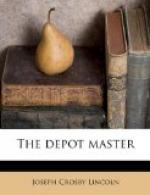“Then he went on to explain. Gabe was rich as all get out, and ’twas his intention to buy back his old man’s house and fix it up for a summer home. He was delighted to find how little change there was in South Orham.
“’No matter if ’tain’t but fifteen cents he’ll get it, if the s’lectmen don’t watch him,’ I says; and the bills, too. I know his tribe.’
“‘You don’t understand,’ says Nickerson. ’He ain’t no thief. He’s rich, I tell you, and he’s cal’latin’ to do the town good.’
“‘Course he is,’ I says. ’It runs in the family. His dad done it good, too—good as ‘twas ever done, I guess.’
“But next day Gabe himself happens along, and I see right off that I’d made a mistake in my reckonin’. The Honorable Atkinson Holway wa’n’t figgerin’ to borrow nothin’. When a chap has been skinnin’ halibut, minnows are too small for him to bother with. Gabe was full of fried clams and philanthropy.
“‘By Jove! Stitt,’ he says, ‘livin’ here has been the dream of my life.’
“‘You’ll be glad to wake up, won’t you?’ says I. ‘I wish I could.’
“‘I tell you,’ he says, ’this little old village is all right! All it needs is a public-spirited resident to help it along. I propose to be the P. S. R.’
“And on that program he started right in. Fust off he bought his dad’s old place, built it over into the eight-sided palace that’s there now, fetched down a small army of servants skippered by an old housekeeper, and commenced to live simple but complicated. Then, havin’ provided the needful charity for himself, he’s ready to scatter manna for the starvin’ native.
“He had a dozen schemes laid out. One was to build a free but expensive library; another was to pave the main road with brick; third was to give stained-glass windows and velvet cushions to the meetin’ house, so’s the congregation could sleep comfortable in a subdued light. The stained-glass idee put him in close touch with the minister, Reverend Edwin Fisher, and the minister suggested the men’s club. And he took to that men’s club scheme like an old maid to strong tea; the rest of the improvements went into dry dock to refit while Admiral Gabe got his men’s club off the ways.
“’Twas the billiard room that made the minister hanker for a men’s club. That billiard room was the worry of his life. Old man Jotham Gale run it and had run it sence the Concord fight, in a way of speakin’. You remember his sign, maybe: ’Jotham W. Gale. Billiard, Pool, and Sipio Saloon. Cigars and Tobacco. Tonics and Pipes. Minors under Ten Years of Age not Admitted.’ Jotham’s customers was called, by the outsiders, ’the billiard-room gang.’
“The billiard room gang wa’n’t the best folks in town, I’ll own right up to that. Still, they wa’n’t so turrible wicked. Jotham never sold rum, and he’d never allow no rows in his place. But, just the same, his saloon was reckoned a bad influence. Young men hadn’t ought to go there—most of us said that. If there was a nicer place to go, argues the minister, ’twould help the moral tone of the community consider’ble. ‘Why not,’ says he to Stingy Gabe, ’start a free club for men that’ll make the billiard room look like the tail boat in a race?’ And says Gabe: ‘Bully! I’ll do it.’”




